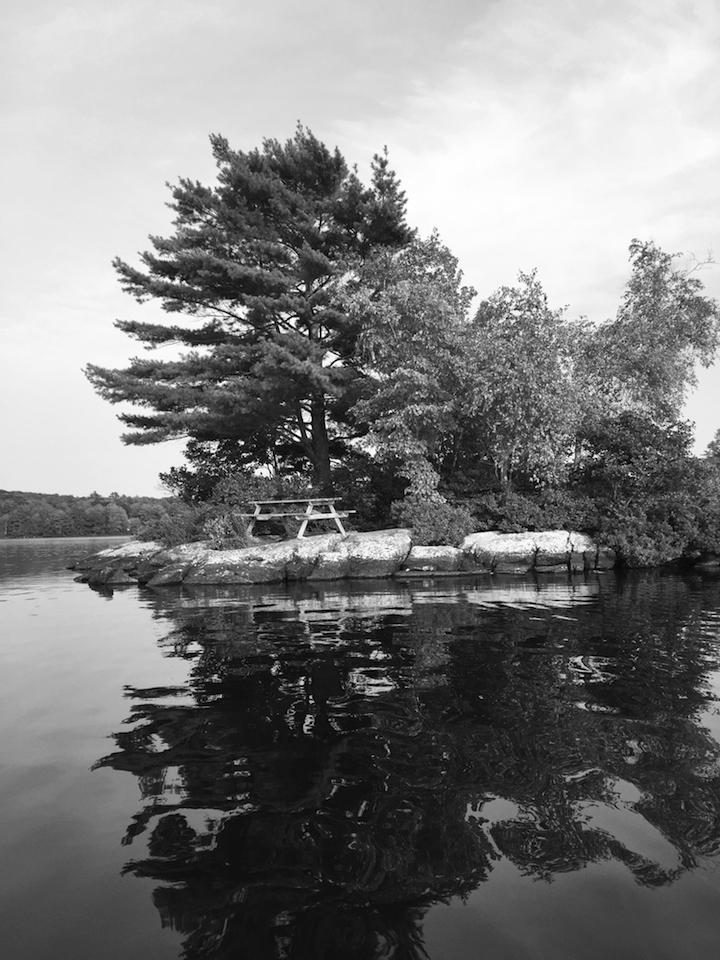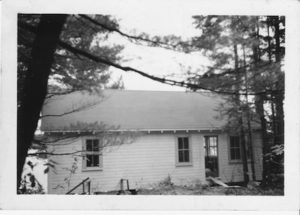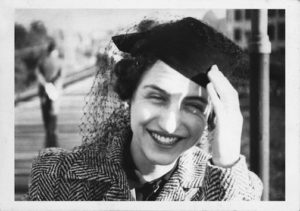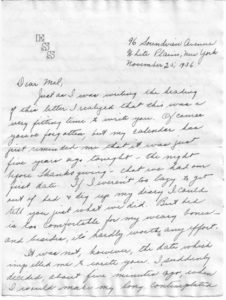
Loon Island
At night I open all the shades so the dark comes in. This summer, I like the wide expanse of night. The full moon is high, and I see individual strands of onion grass in the shallow spot between the shores. Tomorrow we will learn that tonight’s moon is “blue,” a rare extra full in the cycle of moons. Truly, it is orange, and hovers low over the trees.
Late into the night and early in the dawn, the loons call for each other. Instead of sounding mournful, as they often do, their calls rise up at the end—exploratory, cheerful they have found each other.
At first there are two of us here, later four. One day the wind is so strong a parade of things blows off the dock, each next flight somehow unexpected. Towels, a watch, goggles, and finally a chair. It takes two days for the chair to dry, two days listening to the loons’ strong and familiar cries, the ones that end in worry, beseeching. Some of the calls are made by juveniles, either lost or simply practicing the sounds they will need when they are older, perhaps soon.
My father comes over to canoe with us. We have caught an hour before the afternoon thunderstorms and glide along under a light cover of clouds. We head toward a patch of rock and trees called Loon Island, which is good for nothing, really—just a destination. Some years ago, someone balanced a picnic table on the edge, but I’ve never seen anyone eating there. We try to count how long the loon we’re following stays underwater. We get to two minutes, then three, then realize how hopeless our task is because the loon could be anywhere, could have popped up somewhere behind us or on any other side of the island, out of sight. From the stern, my father tells stories, some old, some with new spins. He has canoed this lake for nearly forty-five years, since being introduced to it by my mother. For most of that time, the lake, the property, the cabin, the warrenlike inner spaces, the airless loft, the moldy basement, and the otherworldly tranquility of it all was the province of my grandparents. The Mayer family spent summers here since the original cabin was built in 1940.
G & G loved this place fiercely. They shared it generously and dogmatically. There were rules. Grandchildren were invited without their parents or siblings to decrease drama and sullenness and to increase camaraderie among the cousins. You had a lot of freedom, but you did what you were told. No riding in the canoe without a life vest until you passed the swim test: thrown overboard fully clothed, including shoes, you removed each article, then treaded water for ten minutes. If you wanted to swim across the lake, which was encouraged, a canoe had to accompany you. Fishing without a license was illegal and therefore prohibited. You cleaned what you caught and you ate it. You helped with any chore—pruning trees, raking blueberries or burning the bushes at the end of the season, cutting and hauling wood. Allergies were believed to be psychological. You ate all of what you served yourself or no dessert. There was always dessert.
There was also frequent bickering, after forty, fifty, nearly sixty years of marriage.
Ellie: Turn down the fan—it’s the loudest thing in the house!
Mal (to one of us): You know what’s the loudest thing in the house? Your grandmother complaining.
Cocktail hour was at five. You mixed and served the drinks, a gin and tonic or a bottle of beer. Always bottled. After careers in the brewing industry, cans were an abomination. Snacks were salted nuts or spicy Japanese rice crackers sent from Mr. Yoshimura in Kyoto, stored in old fruitcake tins.
They loved us, they were proud of us, they told us when we were in the wrong. Some days, I miss them terribly.
My husband never knew Ellie or Mal, nor did the friends here with us. This missing link between the past and the present fills me with sadness. Regret that feels like hunger. That tiresome, unquenchable human desire to make the living meet the dead. I could not be here now with these people I love without the stubborn old Jews who built this place.
Ellie Schwarz met Mal Mayer in the fall of 1931. Their first date was the night before Thanksgiving. He was a junior at MIT; she was starting her freshman year at Wellesley. He was from Boston, she from New York. He was six-foot-four, she five-foot-two. They dated, and socialized in groups, and corresponded over summer and winter breaks. They dated other people. Mal dated a lot of other people. He was seriously involved with one, a woman named Rosemary. Mal graduated with an engineering degree in 1933, a devastating time to look for jobs. His father had a plumbing supply business, and he may have helped there; at one point he lived with Lionel, a childhood friend, and Lionel’s new wife Gert in Detroit and worked in a factory. They ate potatoes. Mal’s weight dropped to 140 pounds.

The cabin on Washington Pond, 1940
Ellie graduates in 1935 with a degree in chemistry and finds a grant-funded position at a hospital in New York. She also teaches Sunday school for twenty dollars a month. She works hard at the hospital because she likes to work and because she wants the grant to be renewed. When she discovers her employer wants—insists on—more than a business relationship, she quits. She despairs at not finding another job. Her backup plan is to go to business school. Finally she begins work at Schwarz Laboratories, her father’s company. Founded in 1880 by Anton Schwarz, Ellie’s great-grandfather, the lab advances the science and production of beer brewing. At first Ellie is unhappy. Her supervisor, Dr. Laufer, doesn’t let her do anything but look on.
During these years after college, Ellie and Mal write regularly but see each other infrequently. Ellie often invites Mal to New York and schemes trips to Boston, but these rarely come through.
In March 1939, Ellie goes on a cruise with her mother and younger brother. Mal sends flowers to greet their arrival in their stateroom. It is unclear if these are a parting gift or a declaration of love. Ellie doesn’t know what will happen to the two of them, even though, by this time, Mal is also employed at Schwarz Lab and living in New York.

Eleanor Schwarz, 1939
News of their engagement is privately circulated a month after the cruise and announced in the New York Times, the New York Post, and the Boston Globe, among other places, the third week of May. They are married on June 30.
Ellie is given, as a wedding present from her mother-in-law, a parcel of land of seventy-five acres on Washington Pond, where Mal had spent several summers. That is the story. That is what we were told.
One morning we’re eating breakfast on the dock and see, a few feet away, under the floating dock, a duck. The sun is overhead, and the duck is shy. We have to crane our necks to see it. It appears to be the mother of the small flock nesting nearby, down the shore toward the camp, the boys’ and girls’ divisions of which were attended by my grandfather in the twenties, my mother, aunt, and uncle in the fifties, my cousins in the seventies, and my cousins’ children up to this very day. The duck is large and speckled brown and white. It is so still, we wonder if it is alive. Then a small wave comes and shifts the position of the dock, and the duck paddles one orange foot to maintain its position and avoid the rope tied to the rock anchor. We finish our breakfast and coffee and go inside. Later, we come down to read, and the duck is still there. It makes no noise. Where is its clan? It preens itself with its flat bill but otherwise remains still. In the afternoon, one of us goes out for a swim and splashes it and it doesn’t move. We toss pieces of tortilla chips in its direction and it refuses the bait.
Late in the day, after working, reading, napping, we sit on the dock with drinks and listen to soft laps of waves against the shore. Clouds stuff themselves with the most ambitious whiteness. Fish jump. Dragonflies buzz out the last of the day. We stare across the shore. This is the same view my grandparents saw. I am thrilled by loons and their calls because G & G were. They were so proud of this patch of land. Not because of its value, or its generous size, or its remarkable wildlife, but because it was their corner of the world.
Now many of us own the property together. This does not take away from my feelings of intense ownership and pleasure. Even when it belonged to only two people, it belonged to the rest of us as well. But time has passed, my grandfather has been dead fifteen years, the original cabin torn down to the studs and foundation and built back up for modern families. The giant fieldstone fireplace the only remainder of the original. The loft is gone. The wing containing my grandparents’ bedroom and bathroom transformed into a two-story unit of tight bedrooms and baths. My grandfather’s workshop with the machinery and the moldy canoe paddles and the toads filled in. The canvas Old Town canoe long ago replaced.
As we canoe the lake for the last time, I sit in the middle, nursing a headache. The lake has been calm all day, the sun strong, the last of summer. We go look for the rumored bushes of wild blueberries, but don’t find them. The lily pads are yellow-green and gorgeous. We skim through fading purple water hyacinths in two inches of water and head back toward the cabin, making a long slow loop around Loon Island.
Then it all unfolds. All the days and nights adding up to three weeks, the longest I’ve spent at the cabin in years, compress to this moment. First the loon pops up at eleven o’clock, so close we see the red of its eyes. The sun streams onto its spotted back. We drift closer, and it dives down, and up, and down for good, and we are left with our breathlessness. The closest we’ve been. Then, just past Turtle Cove, on the last bank before the cabin comes into sight, we slow, because there is the bald eagle we’ve previously seen only briefly in flight. Perched on the tangled limbs of a dead tree. We are still far away but we are sure. We stop everything. Twist and turn and quiet our hearts. He sits. The scaly talons, the terrible beak, make me tremble inside. He flies to a higher branch. He’s out of range. We wait. Then he picks up and beats his wings, cutting directly above our heads—a white-headed arrow with white tail feathers, all brown furious motion in between. The nest must be here, explaining his flight path across the shallow inlet where the cabin sits. Here is an eagle, and he is to be admired. There is nothing, gloriously nothing, we can do but know and appreciate his existence.
My grandmother died on April 26, 1998, two weeks after her eighty-fourth birthday. Two and a half years later, my grandfather died, on November 23, 2000. Thanksgiving Day, sixty-nine years after his first date with my grandmother. He’d lived to attend my college graduation that spring and spent the summer in the cabin, in much the same shape and style it had been for decades. But the building had begun to deteriorate—the knob-and-tube wiring a fire hazard, the mold overwhelming. Family and local friends continued to visit, to swim and canoe, but overnights in the cabin became impossible. In the wake of his death I returned to my first postgraduate job, a job I loved, and thought of my grandparents often, but not intensely. The following year, I met my husband and the seed of regret that he’d never know Mal or Ellie began to grow.
Slowly, because the task was enormous, my mother began to clean things out, from the cabin and from the small apartment attached to my parents’ house where my grandparents lived in the winter. One summer, braving the dusty heaps in the garage, my mother discovered a falling-apart canvas traveling case, gnawed at the corner by rodents. Inside were a hundred years’ worth of letters from my grandmother’s family, Schwarzes and Weingarts, dating back to the late 1800s, many of the letters in German. My mother was floored. Why were they here, in the garage? Why had she not known about them? What did they say? Many would need to be translated.
Then, just before the Washington cabin was demolished, my mother did a last sweep to make extra sure nothing of value would be left behind. There used to be a closet between my grandparents’ bedroom and their bathroom and above that closet was a crawlspace. At the back, the way back, so far under the eaves you had to stand on a tall chair (or be very tall yourself, as my grandfather was) to even know it was there, was a box of papers. I say “papers” because not only were there letters—dozens and dozens spanning my grandfather’s life through the sixties (later letters were kept elsewhere and were known about)—but also business correspondence, legal documents, tax receipts, the program from his confirmation. All jumbled together. It appeared he had never thrown away a single shred of evidence of his existence. No one had known about this collection either. Letters from my grandmother; from Lionel; from Rosemary, the woman Mal nearly married. Had he, too, forgotten about them? Doubtful, but the present can so easily crowd out the past.

I begin with Ellie’s letters to Mal. He was the packrat, the collector. There are no letters from Mal before he and Ellie are married. Quickly I learn that my grandmother would not want me reading. She did not want her letters kept.
September 1, 1936:
I have been wondering how you are getting along and what your plans and hopes are. Won’t you write me about them. I don’t keep my letters, so you will never be face [sic] with them again. You know, your little habit of keeping your correspondence makes it very difficult for me to write you freely. I always wonder how my sentiments will sound in the future when the events which occasion them are dim shapes in the far distant past. I’d be afraid to read them myself, much less let anyone else see them.
I can’t stop reading. The letter is full of emotional turns. They have known each other nearly five years. The letter begins with an accusation: “Dear Mal, They’re all wrong—all the things you have been thinking about me. That is, if you thought about me at all.” What is he thinking? She is miserable to be out of work—“a jobless existence is not for me.” She ends on a plaintive note, asking for a favor “you are probably going to want to refuse”: Ellie has no photographs of Mal, and she wants one to add to her collegiate memories. “And you know you were an important part of my college career, so much so that the collection would be incomplete without a snap of you.… Can’t I have one of you to add to the collection? Please?” This is the last line. The letter is typed, which is unusual, and she signs simply her name, not “Fondly” or “As ever,” as in most of her other notes.
Three years later, before they go on their official honeymoon, an extended tour across the United States, to Yosemite, to the Biltmore in Los Angeles, they take their first joint trip to Maine. To the property Ellie has been gifted by Mal’s mother.
But the Washington land was not a gift. That story, told to my mother and her brother and sister, is untrue. My grandfather made it up.
The land was not purchased by Mr. and Mrs. Joseph Mayer. The land was purchased by Malvin Mayer, age twenty-seven, for $850. Correspondence regarding the sale stretches back to 1938, and the deal went through in April 1939, two months before Ellie and Mal were married. Likely before their engagement was even decided between them—before Mal proposed. It is true that the deed is in the name of Mal’s mother, but this was by Mal’s explicit request.
Why would Mal cover up the truth? Perhaps the better question is: Who was the story for? Mal was not a romantic, nor was it important that his parents be perceived as generous—they had little money. Mal’s children would not have cared how the land came to be theirs.
My mother believes the story was for Ellie. Ellie had strong opinions, and a strong belief in a marriage of equal partnership. This being the late thirties, and finances, and gender equity, being what they were, Ellie might very well have objected to her new husband’s expenditure of this not insignificant sum, on a vacation home no less. Also possible: when Mal arranged to buy the land, he’d not intended to get married for some time, so when Ellie pushed him to make up his mind about her (as my mother remembers her saying), Mal had to think fast to explain the land. Why begin a marriage with a bone of contention? Mal could get what he wanted without any fuss at all if the land were a gift.
The truth is, I am not discovering the facts of the Washington Pond property sale for the first time. My mother told me when she found out, several years ago. She was shocked. She told her brother. He was disbelieving enough to look up the deed himself, in person, on his next trip to Maine. But at the time my mother told me, the revelation did not resonate. Why now? Because now the stories of the past are falling to me. My husband and friends are here with me at the cabin. They ask questions. I think I know the answers, and I tell them a story, but I know it’s not the whole truth. I crave the past laid bare, those boxes and boxes of evidence. I miss Ellie and Mal. I feel a need to understand who they were as humans, not only through the eyes of a doted-upon grandchild. There is so much to know.
Late in the evening, we come to the realization that the duck is sick. It is not moving because it can’t. I imagine that in the morning there will be a floating ball of feathers, feet kicked to the side and touching the surface unnaturally. My grandfather used to send me far into the woods to dispose of dead mice and corncobs, so wild scavengers wouldn’t come too near the house. Will we have to carry a dead duck far into the trees?
After dinner, the moon rises, and its shimmer across the water is irresistible. We stand in the dark with the light of the house behind. To the right the water rustles, ripples, and a small group of shadows crosses in an arc in front of the dock, to the lily pads, and in so doing they pass through the moonbeam. They are not illuminated, but the water of their wake catches fire. From their quacks we know their species. Farther out, a pair of loons glide by gracefully and silently.
We are transfixed. There is no movement from under the floating dock. In the morning the duck is gone.
-Jennifer Acker, Editor in Chief
Washington Pond, Maine
[Purchase your copy of Issue 10 here.]




